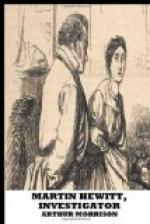Hewitt smiled. “Perhaps it’s not quite so uncomplimentary, after all,” he said. “If you can’t recognize the writing, never mind. But, if he’s gone away to sell you, it isn’t much use finding him, is it? He won’t win if he doesn’t want to.”
“Why, he wouldn’t dare to rope under my very eyes. I’d—I’d——”
“Well, well; perhaps we’ll get him to run, after all, and as well as he can. One thing is certain—he left this place of his own will. Further, I think he is in Padfield now; he went toward the town, I believe. And I don’t think he means to sell you.”
“Well, he shouldn’t. I’ve made it worth his while to stick to me. I’ve put a fifty on for him out of my own pocket, and told him so; and, if he won, that would bring him a lump more than he’d probably get by going crooked, besides the prize money and anything I might give him over. But it seems to me he’s putting me in the cart altogether.”
“That we shall see. Meantime, don’t mention anything I’ve told you to any one—not even to Steggles. He can’t help us, and he might blurt things out inadvertently. Don’t say anything about these pieces of paper, which I shall keep myself. By-the-by, Steggles is indoors, isn’t he? Very well, keep him in. Don’t let him be seen hunting about this evening. I’ll stay here to-night and we’ll proceed with Crockett’s business in the morning. And now we’ll settle my business, please.”
* * * * *
In the morning Hewitt took his breakfast in the snuggery, carefully listening to any conversation that might take place at the bar. Soon after nine o’clock a fast dog-cart stopped outside, and a red-faced, loud-voiced man swaggered in, greeting Kentish with boisterous cordiality. He had a drink with the landlord, and said: “How’s things? Fancy any of ’em for the sprint handicap? Got a lad o’ your own in, haven’t you?”
“Oh, yes,” Kentish replied. “Crockett. Only a young un not got to his proper mark yet, I reckon. I think old Taylor’s got No. 1 this time.”
“Capital lad,” the other replied, with a confidential nod. “Shouldn’t wonder at all. Want to do anything yourself over it?”
“No, I don’t think so. I’m not on at present. Might have a little flutter on the grounds just for fun; nothing else.”
There were a few more casual remarks, and then the red-faced man drove away.
“Who was that?” asked Hewitt, who had watched the visitor through the snuggery window.
“That’s Danby—bookmaker. Cute chap. He’s been told Crockett’s missing, I’ll bet anything, and come here to pump me. No good, though. As a matter of fact, I’ve worked Sammy Crockett into his books for about half I’m in for altogether—through third parties, of course.”
Hewitt reached for his hat. “I’m going out for half an hour now,” he said. “If Steggles wants to go out before I come back, don’t let him. Let him go and smooth over all those tracks on the cinder-path, very carefully. And, by the by, could you manage to have your son about the place to-day, in case I happen to want a little help out of doors?”




